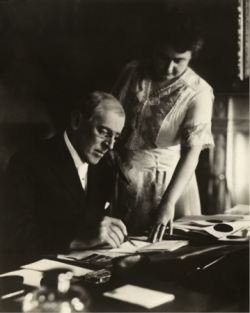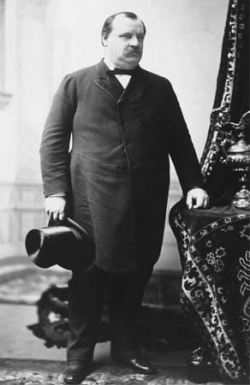
America’s Least Healthy Presidents
- Find out which important organ had major health impacts on three of America’s unhealthiest presidents
- Did one of our presidents seal his fate with jelly beans?
- Find out how to be healthier than our former leaders with these easy tips.
Dear Reader,
Happy Presidents Day!
In celebration of the holiday, today’s edition of Living Well Daily is going to take a little trek through time to look at the health of a few American presidents.
We will also reveal who takes the title of America’s Most Unhealthy President and what factors attributed to it.
Being the commander in chief of one of the most powerful nations in the world isn’t a cakewalk. Needless to say, it’s the kind of job that will take a toll on your health.
And as you we see, there is one organ that plays a vital role in the health of our former leaders. I will explain more later.
Let’s move on to some presidential health stats real quick…
Of America’s 44 presidents, eight have died while in office. Four of these were due to assassination, and four were due to natural causes.1
So it seems if you’re a president destined to die in office, there is a 50/50 chance you will die by violence or of health issues. Either way, it doesn’t look good. But eight of 44 isn’t exactly an astonishing number.
However, it’s when you take a deeper look at the personal health profiles of a few of these leaders that things get a little more interesting.
Before we dive into that, let’s take a closer look at the health issues of three of our presidents who didn’t die in office.
![]() Presidential Problems
Presidential Problems
Ronald Reagan, the 40th president (1981–89), suffered from many health ailments over the course of his life, including a bullet wound he received in 1981 during an assassination attempt. While President Reagan survived a bullet to the chest, he had worse health problems to deal with, including colon and skin cancers, prostate stones, and, lastly, Alzheimer’s disease.

Ronald Reagan handing a jar of jelly beans to Bill Clinton. Maybe Clinton ate them with his McDonald’s Big Macs?
Photo credit: msnbc.com
Known for an almost photographic memory during his time in office, Reagan’s memory went downhill during his 70s. At times, his memory would fail so badly he would forget the names of foreign dignitaries and even familiar staff members.2
President Reagan was also famous for his sweet tooth. In fact, 3.5 tons of Jelly Belly jelly beans were delivered for inaugural celebrations at the White House. Jelly Belly even created their Blueberry flavor for the event.3
Since research indicates high added sugar intake can increase your risk of cardiac disease, it would make sense that Reagan’s jelly bean habit may have attributed to his overall bad heath.4
As we have pointed out in a previous article, cardiovascular health is vital to maintaining brain health and staving off memory disorders.
Reagan died from pneumonia in 2004 at the age of 93 after a decade-long battle with Alzheimer’s.5
Next up on the unhealthy list is the 28th president (1913–1921), Woodrow Wilson. While Wilson is not quite the leader of the pack, his health was worse than President Reagan’s, for the most part.
Wilson experienced headaches, high blood pressure, and double vision during his adulthood. These symptoms may have been the precursor for the series of strokes Wilson suffered. These strokes started in 1896. In 1906, one of these strokes left him blind in his left eye.
However, in 1919, he suffered an immense stroke that left him paralyzed on his left side, forcing him to use a wheelchair and later a cane. In order to keep his reputation intact, Wilson kept his medical condition out of public view until 1920.

Woodrow Wilson getting help from his second wife, Edith, after his stroke.
Photo Credit: Library of Congress
In fact, his condition had deteriorated so greatly that it’s thought that his second wife, Edith, had to make all presidential judgments for him during his last three years in office.
Wilson’s bad health eventually became public knowledge and eventually led the ratification of the 25th Amendment. This amendment clarifies the vice president’s power in the event the president dies or becomes incapacitated. 2
Wilson died on Feb. 3, 1924, just three years after he left office.
The unhealthiest United States president was… (drumroll, please)
Grover Cleveland! Cleveland was both the 22nd (1885–89) and 24th presidents (1893–97) of the United States.
So what sets Cleveland apart? His appetite for rich foods, cigars, and heavy drinking, mostly.
Since his childhood, Cleveland suffered from obesity. Unfortunately, his extra weight followed him into adulthood. He was the second-heaviest U.S. president, weighing in over 250 pounds, surpassed only by William Taft, who tipped the scales at 300 pounds. In fact, Cleveland was so large his nephews and nieces referred to him as “Uncle Jumbo.”2

Grover Cleveland.
Photo Credit: britannica.com
Cleveland often indulged in beer and heavy foods. His love for beer was so strong, he had a very difficult time restricting his intake to four beers a day during a challenge with his rival in a district attorney race. He quickly decided that it was too strict for him to follow.
Cleveland also enjoyed cigars. After several years of smoking, an ulcer formed on the roof of Cleveland’s mouth that turned out to be a cancer. In a secret surgery, the former president had parts of his hard palate and upper left jaw removed. The surgery permanently disfigured Cleveland’s face.2
While Cleveland had a lot of chips stacked against him at the health table, it was his gout that became his worst affliction. Gout is a type of arthritis caused by high levels of uric acid. Gout is debilitating and severely restrictive for most sufferers.
But severe pain is not the worst possible health outcome for those with gout. According to research done by scientists at the University of Oxford, gout is now a marker for cardiac disease. In fact, having gout doubles your risk of having a heart attack or stroke.6
In Cleveland’s case, this risk may have been too much for him to evade — he died from a heart attack on June 24, 1908.7
As you can see, poor heart health is the common thread amongst these unhealthy presidents — Reagan’s Alzheimer’s, Wilson’s strokes, and Cleveland’s gout.
Diet, regular exercise, and reducing stress are the building blocks of heart health, but as you can see from the presidential examples, sometimes you may need a little extra help.
A supplement that helps to support cardiovascular health is olive leaf extract. In fact, a double-blind, randomized, parallel, and active-controlled human clinical study showed that people taking olive leaf extract experienced healthier blood pressure in just eight weeks!8
If you choose to make olive leaf extract a part of your health, be sure to check with your physician before taking it.
If you have any heart-healthy hacks you would like to share, write me! nmoore@lfb.org
Live well,

Natalie Moore
Managing editor, Living Well Daily
Sources
[1] List of U.S. Presidents Who Died In Office
[2] America’s 10 Unhealthiest Presidents
[3] Remembering President Ronald Reagan
[4] Added Sugars Add to Your Risk of Dying from Heart Disease
[5] Health and Medical History of President Ronald Reagan
[6] Risk of heart attack and stroke doubles for patients with gout
[7] Grover Cleveland Biography
[9] Pineapple, Bromelain and Gout: What is bromelain exactly and how does it help with my gout?
Written By Natalie Moore
Natalie Moore is a dedicated health researcher with a passion for finding healthy, natural, and science-based solutions. After a decade of direct healthcare experience in western and natural medicine, she was involved in public health research before joining Living Well Daily.
View More Free Articles
Stop Obsessing Over Diet Trends
Can we stop with the endless diet debates already? Every other week there’s a new headline shouting about which diet is best for weight loss, heart health, or diabetes. Paleo, keto, low-carb, high-protein… it’s exhausting. And now, a new meta-analysis is out comparing the Mediterranean diet, the DASH diet, and something called AHEI (that’s “Alternative...
A New Reason to Ditch Processed Junk
If you’ve ever walked the inside aisles of your local grocery store and thought, “This is all just junk,” your instincts were spot on. A new study published in the journal Thorax just added another red flag to the list of dangers linked to ultra-processed food—a 41 percent higher risk of lung cancer. That’s right....
When Being Winded on Stairs Is Serious (And When It Isn’t)
I had an athlete visit me recently because he experienced shortness of breath while climbing stairs. He is in great shape, so he was worried about what it might mean. “Doc,” he said, “I run five miles three times a week. Why am I huffing and puffing after two flights of stairs?” His concern is...
Study EXPOSES Hidden Danger Lurking in Your Car
We think of our homes and cars as safe havens. But according to a startling new study, they may be flooding your lungs with microscopic plastic particles—every single day. Researchers in France recently found that adults inhale an average of 68,000 microplastic particles daily from indoor air alone. To put that in perspective, that’s about...
Mailbag: Is Modern Food Making You Snore?
“What can cause snoring, and is there a way to correct this issue?” —Seeking Silence Hi Seeking, Snoring happens when the soft tissues in your throat relax and vibrate as air passes through during sleep. While several factors can cause snoring—from sleep position to nasal congestion—I want to share one trigger that might surprise you....
Simple Food Swap SLASHES Dementia Risk 28%
Let’s be honest… who would jump at the chance to cut their dementia risk by 28 percent. And no, you don’t need to run marathons, survive on broccoli, or learn to play the zither (whatever that is) to make it happen. All it takes is one easy swap—something that’s probably already in your refrigerator. Researchers...
This SMART Floss Exposes Hidden Health Danger
Scientists have created dental floss that doesn’t just clean between your teeth—it also tracks your stress while you’re flossing. Now, I know what you’re thinking… “Great—now even flossing is going to stress me out by telling me how stressed I am.” But this fascinating new tool from Tufts University could be a game-changer for understanding...
Is This "Safe" Sweetener Damaging Your Brain?
The headlines are alarming… “Popular Sugar Substitute Linked to Brain Cell Damage” and “Erythritol Could Damage Critical Brain Barrier” are just two of the dozens I’ve spotted recently. But before you toss every sugar-free product in your pantry, let’s take a closer look at what this study actually shows—and what it doesn’t. The latest research...
This Summer Threat Could SPIKE Your Blood Sugar
Picture this… It’s another scorching hot summer day. You crank up the air conditioning while watching the weather forecast, which predicts yet another “record-breaking” heat wave. It’s starting to feel like just another miserably uncomfortable summer. But what you might not realize is that—if you have diabetes—those rising temps could do far more damage to...
Move Over Yogurt—5 Foods That Pack MORE Probiotics
Let’s talk about your gut. The microbiome is the collection of trillions of bacteria and other tiny organisms that live in and on your body—especially in your gut—and help keep you healthy. I’ve written often about how vital it is to maintain a healthy microbiome. And you might have dutifully added yogurt to your shopping...









